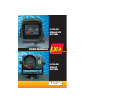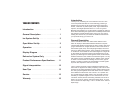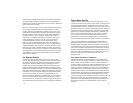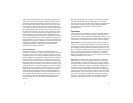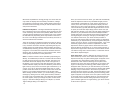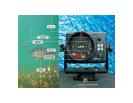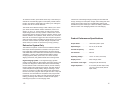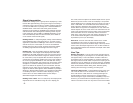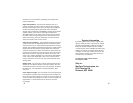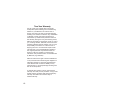
This allows for a larger Zoom window to be viewed on the deep-
er range settings. The Zoom window can be moved anywhere
between the surface and the bottom by use of the UP / DN arrow
keys located on the keypad.
The LX-3 is offered with any one of three different twenty-degree
(cone angle) transducers. The puck-style transducer is often
used for mounting on the bottom of trolling motors or for in-hull
applications. The high-speed transducer is intended for outside
the hull mounting on the transom of a boat and is designed for
picking up depth or return signals at higher speeds. The ice
transducer is a weighted, self-aligning transducer used for ice-
fishing applications. The LX-3 runs off of any 12-volt power
source and includes a power cord for wiring directly to the
battery or into an electrical panel. The unit is mounted onto a
factory-supplied gimbal bracket that can be in turn attached to a
rotating swivel base (not supplied) or mounted directly to a boat
deck, drivers console, portable electronics shuttle, or located in
an electronics locker. The LX-3 is designed to withstand moisture
from rain, sleet or snow. This unit was tested under the harshest
of conditions to ensure that you will receive the kind of depend-
ability that you deserve.
Ice System Set-Up
Your LX-3 comes virtually ready to fish. All you need to do is
hook up the positive lead from the LX-3 power cord and DCS to
the positive terminal of the battery. If the LCD display indicates
less than 70 percent of battery charge remaining, it’s recom-
mended that you plug in the power supply as described under
Digital Charging System (see section Deluxe Ice System Only).
Inside the LX-3 deluxe soft pack is an electronics shuttle that has
recessed compartments for the battery and transducer. Take the
transducer out of the recessed holder and rotate the adjustable
ice arm out from inside the shuttle. The adjustable ice arm
allows for maximum flexibility in positioning the LX-3 around the
ice hole. The transducer is weighted and self-aligns no matter
how uneven the ice. The amount of cable hanging below the ice
arm should allow for the transducer to be completely submersed.
Open-Water Set-Up
The LX-3 is an excellent sonar unit for open-water use. To con-
vert the LX-3 from an ice system to open water, remove the LX-3
powerhead, gimbal bracket, and powercord from the soft pack.
The gimbal bracket can be mounted on any flat surface. The unit
should be mounted in a location that is free from other electrical
apparatus to eliminate interference. If interference is observed,
reposition the unit until optimum performance is obtained. Your
boat’s 12-volt DC electrical system can be used to power the
unit. A power bus can be used, but interference may result.
Interference is recognized as random flashes around the dial.
Lowest noise will be obtained by direct connection to the battery.
The LX-3 is protected from accidental polarity reversals. No
damage will result from an incorrect battery hook-up. The ice-
fishing transducer supplied with the Ice System is not designed
for open-water use. There are two transducer choices for use in
open water. The high-speed transducer is designed for transom
mounting (outside the hull) and reads depth while the boat is on
plane. The puck-style transducer is most often mounted on the
bottom of a trolling motor or epoxied into the hull of a
fiberglass boat.
High-Speed Transducer Installation
High-Speed transducers are designed to be mounted on the
transom of a boat. If properly installed, you will be able to read
depth, weeds, and fish while the boat is on plane. Transducer
mounting location is critical for optimum performance of the LX-3
sonar unit. The mounting location should be free of any white
water or turbulence resulting from rivets, ribs or hull strakes. It is
preferable to mount the transducer at least 18 inches from the
centerline of the boat to avoid turbulent water resulting from the
outboard motor. The transducer is wedge-shaped and should be
mounted with the leading edge mounted against the transom.
The leading edge of the transducer should be mounted flush with
bottom of the boat. This can be best achieved by using a flat
object like a ruler and holding it flat along the bottom of the boat
and matching the bottom of the transducer to the bottom of
the boat.
2 3



